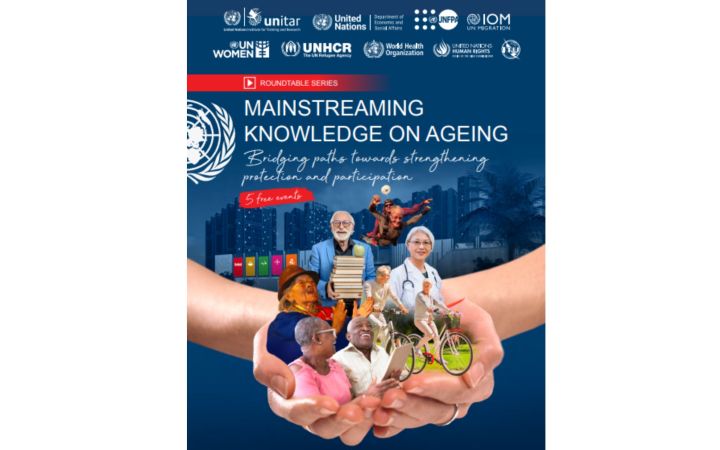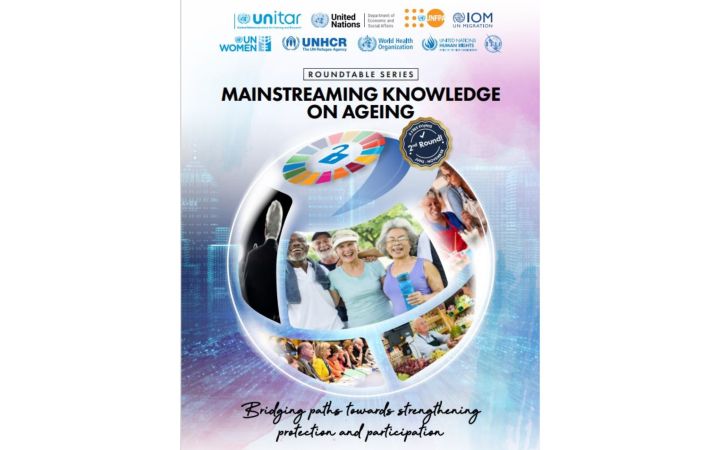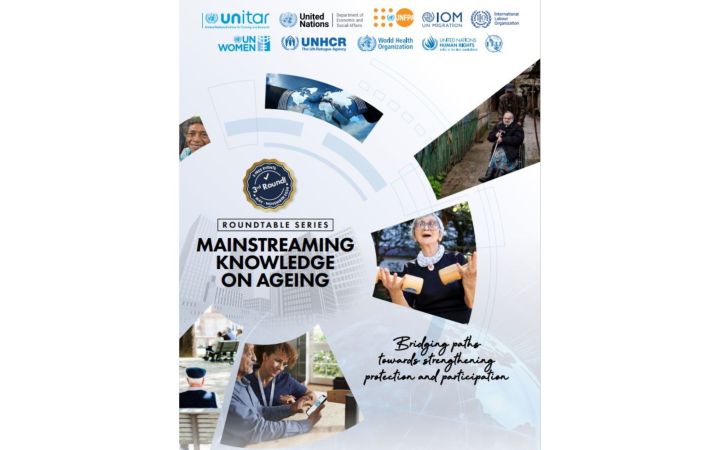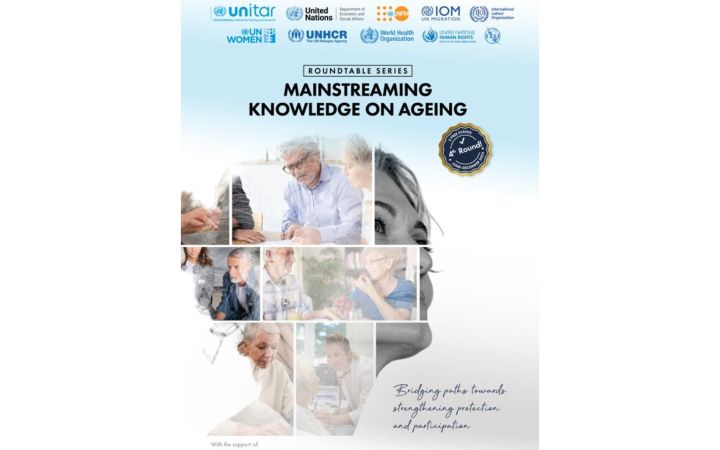OUR MISSION
UNITAR through its Division for People and its CIFAL Global Network, UNDESA, UNFPA, IOM, UNWOMEN, UNHCR, OHCHR, ITU, ILO, and WHO with its Global Network for Age-friendly Cities and Communities, together with the Group of Friends of the Human Rights of Older Persons -conformed by States, represented by their Permanent Missions to the United Nations in Geneva,- the Global Initiative on Ageing Foundation (GIA), the International Network for the Prevention of Elder Abuses, the International Longevity Centre; the NGO Committee on Ageing Geneva, and the Harvard Law School Project on Disability, have joined efforts to put together this initiative as a contribution to inclusive learning in the framework of the UN Decade of Healthy Ageing and the implementation of the Madrid Action Plan.
BACKGROUND
Throughout the years, different stakeholders have struggled for the effective promotion and protection of the human rights of older persons. As a result, landmark steps have been taken at international level to strengthen the protection of this group, including the UN Principles for older persons (1991), the adoption of the Madrid International Plan of Action on Ageing in 2002, the creation of the Open-Ended Working Group for the purpose of strengthening the protection of the human rights of older persons (2010), the creation of the mandate for the UN Independent Expert on the enjoyment of all human rights by older persons (2013), and the UN Decade of Healthy Ageing (2021-2030), as well as the adoption of specific Resolutions in the framework of the UN General Assembly and the UN Human Rights Council.
While remarkable progresses in particular mechanisms, programs, projects, plans and campaigns have been developed to implement and follow up the commitments undertaken at local, national, regional, and international level, several challenges remain towards the full enjoyment of the rights of older persons.
Problems of ageism, together with gender and other causes of discrimination, as well as the intergenerational gap have increased due to different frontier issues, in particular new technologies, human mobility, and climate change.
In addition, there are still pending tasks to ensure the dignity and human rights of this group, particularly in accessing health and long-term care, life-long learning, the labour market as well as the prevention of abuse and violence.
In this regard, an integral approach is needed to maximize synergies and identify interlinkages across existing and future initiatives. A better understanding of missing elements can be useful to provide the necessary attention, resources, information, options for integration, and services for older persons, including those who are migrants or refugees. The experience coming from ageing place elderly people in a strategic position for supporting this endeavour.
TARGET AUDIENCE
The event is open to different actors interested in Ageing and the rights of older persons, including:
- Public sector officials, policy makers and practitioners
- International Organizations
- Civil Society
- National Human Rights Institutions
- Academia
- Private sector
IMPORTANT NOTES
Video recordings of the series are available at UNITAR’s SDP youtube channel: https://www.youtube.com/c/UNITARDivisionforPeopleandSocialInclusion/ featured as well as on the Decade of Ageing platform: https://www.decadeofhealthyageing.org. After the celebration of the events, those participants who joined them will be receiving the respective video recording together with takeaway messages. This information will serve as a basis to keep mainstreaming knowledge towards strengthening the protection of older persons.
CERTIFICATES OF PARTICIPATION
Participants who want to receive a certificate of participation need to fulfil two criteria:
a) Having participated at least 75% of the time per event. (To be measured by the system)
REGISTRATION
These series are open and free to All. For the 5 virtual roundtables that constitute the series, just one registration on Zoom is needed. Participants will receive the link for each virtual roundtable one day before the event. Additional and specific information on each event will also be shared!
LEARNING MATERIALS FROM THE EVENTS
Find below the concept notes, takeaways documents, video-recording of events, and the annual reports clustered of the Series.
2022 This year, the series focused on taking stock of the current scenario of ageing and the human rights of older persons and learn about frontier issues
Learning objectives:
- Better understanding the current scenario on the thematic.
- Learning from some good practices and challenges, including policies and strategies, from different stakeholders.
- Identifying the linkages between the rights of older persons and frontier issues.
- Recognizing possible synergies for strengthening the protection as well as promoting the free, active, and meaningful participation of older persons.
2023 This year, the series focused on learning about accessibility and its impact at individual and collective level. We explored the linkages of accessibility with justice, political participation, labour markets, l health and social care services, cultural and leisure activities
Learning objectives:
- Better understanding the impact of accessibility in different grounds along ageing, in particular for older persons.
- Learning from some good practices and challenges, including laws, policies, and strategies on accessibility issues, from different stakeholders.
- Identifying possible ways to improve accessibility conditions for older persons.
- Recognizing possible synergies for strengthening the protection as well as promoting the free, active, and meaningful participation of older persons.
2024 This year, the series focused on quality of life for older persons. This initiative is aligned with the efforts envisaged at “Our Common Agenda” to strengthen and accelerate multilateral agreements, particularly the 2030 Agenda for Sustainable Development, towards making a tangible difference in people’s lives; in the same vein, it considers relevant aspects on the protection of the human rights of older persons
Learning objectives:
- Fostering knowledge on the impact of including older persons in the implementation of multilateral agreements.
- Learning from some good practices and challenges, including laws, policies, and strategies on accessibility issues, from different stakeholders.
- Identifying existing initiatives and possible ways to improve quality of life for older persons.
- Recognizing possible synergies for strengthening the protection as well as promoting the free, active, and meaningful participation of older persons.
2025. THIS YEAR SERIES WILL BE THE OPPORTUNITY TO LEARN ON ADVANCING THE HUMAN RIGHTS OF OLDER PERSONS IN TIMES OF CONVERGING CRISES. CRITICAL ISSUES AFFECTING OLDER PERSONS WILL BE ADDRESSED, INCLUDING THEIR RIGHT TO WORK, HEALTHCARE, TECHNOLOGIES, LEGAL PROTECTION, AND FOOD SECURITY IN TIMES OF PEACE AND WAR
Learning objectives:
- Fostering knowledge on the impact of including older persons in the implementation of standards and the work of diverse mechanisms.
- Learning from some good practices and challenges, including laws, policies, and strategies on accessibility issues, from different stakeholders.
- Identifying existing initiatives and possible ways to improve the protection and participation of older persons in times of converging crises.
- Recognizing possible synergies for strengthening partnership to advance the human rights of older persons.
UPCOMING EVENTS (9:30 NY time/15:30 CET)
- 1st Event - The Right to Work for Older Migrants, Refugees, and Stateless Persons. Wednesday 14.05.2025, 15:30-17:00. Watch the recording here!
- 2nd Event - Access to health systems for older persons in conflict areas. Thursday, 19.06.2025, 15:30-17:00. Watch the recording here!
- 3rd Event - The Right to Science and Access to Technologies for Older Persons. Wednesday, 10.09.2025, 15:30-17:00. Watch the recording here!
- 4th Event - Accountability and Redress in Cases of Intersectional Discrimination Against Older Persons. Thursday, 16.10.2025, 15:30-17:00. Watch the recording here!
- 5th Event - Increased Demographics, Urbanism, and the Right to Food for Older Persons. Thursday, 13.11.2025, 15:30-17:00. Watch the recording here!
ACKNOWLEDGMENT OF THE SERIES
- UNGA, Follow-up to the International Year of Older Persons: Second World Assembly on Ageing: Report Of The Secretary-General, UN Doc A/80/147, para. 48. Link
- PILPG's Circle of Former Ambassadors to the UN Human Rights Council, Statement on the Rights of Older Persons and Commitment to an Age-Friendly Future. Link
- UN Decade of Healthy Ageing, Final Report: UNITAR's Mainstreaming Knowledge on Ageing virtual roundtable series 2023. Link
- UN Decade of Healthy Ageing, Virtual Roundtable Series "Mainstreaming Knowledge on Ageing": First Event - The Human Rights of Older Persons and Frontier Issues. Link
- UN Decade of Healthy Ageing, Virtual Roundtable Series "Mainstreaming Knowledge on Ageing" Second Event - Two worlds, same goal: Ongoing efforts at the UN General Assembly & the UN Human Rights Council for the rights of older persons. Link
- Age Platform Europe, The impact of including older persons in the implementation of multilateral agreements. Link
- Harvard Law School Project on Disability, Mainstreaming Knowledge on Ageing: UNITAR's 2023 roundtable series to promote the rights of older persons. Link
- Harvard Law School Project on Disability, Ageing, Urbanization, and the Right to Food: The final event in UNITAR's yearlong roundtable series "Mainstreaming Knowledge on Ageing". Link
CONTACT
Are you interested in exploring possible synergies to develop learning initiatives on Ageing and Older Persons? Contact us!
Mme. Analucía Jácome, Senior Project Leader and Human Rights Expert, SDP, Division for People and Social Inclusion, UNITAR, at analucia.jacome@unitar.org





